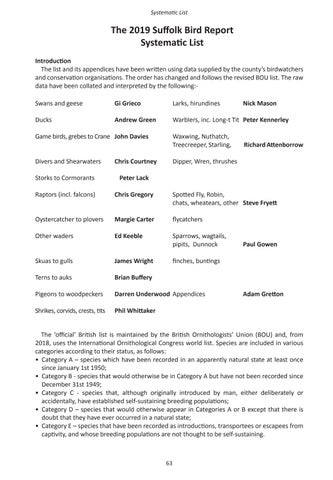Systematic List
The 2019 Suffolk Bird Report Systematic List Introduction The list and its appendices have been written using data supplied by the county’s birdwatchers and conservation organisations. The order has changed and follows the revised BOU list. The raw data have been collated and interpreted by the following:Swans and geese
Gi Grieco
Larks, hirundines
Ducks
Andrew Green
Warblers, inc. Long-t Tit Peter Kennerley
Game birds, grebes to Crane John Davies Divers and Shearwaters
Waxwing, Nuthatch, Treecreeper, Starling,
Chris Courtney
Nick Mason
Richard Attenborrow
Dipper, Wren, thrushes
Storks to Cormorants
Peter Lack
Raptors (incl. falcons)
Chris Gregory
Spotted Fly, Robin, chats, wheatears, other Steve Fryett
Oystercatcher to plovers
Margie Carter
flycatchers
Other waders
Ed Keeble
Sparrows, wagtails, pipits, Dunnock
Skuas to gulls
James Wright
finches, buntings
Terns to auks
Brian Buffery
Pigeons to woodpeckers
Darren Underwood Appendices
Shrikes, corvids, crests, tits
Phil Whittaker
Paul Gowen
Adam Gretton
The ‘official’ British list is maintained by the British Ornithologists’ Union (BOU) and, from 2018, uses the International Ornithological Congress world list. Species are included in various categories according to their status, as follows: • Category A – species which have been recorded in an apparently natural state at least once since January 1st 1950; • Category B - species that would otherwise be in Category A but have not been recorded since December 31st 1949; • Category C - species that, although originally introduced by man, either deliberately or accidentally, have established self-sustaining breeding populations; • Category D – species that would otherwise appear in Categories A or B except that there is doubt that they have ever occurred in a natural state; • Category E – species that have been recorded as introductions, transportees or escapees from captivity, and whose breeding populations are not thought to be self-sustaining.
63














